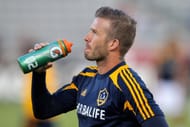Football isn’t just about training to run, kick, dribble, and tackle for playing those 90 minutes; to support the body throughout the two halves, a professional footballer goes through a strict diet regime.
Sticking to this diet is as important to a footballer as going for training sessions and honing their skills lest low energy on a matchday can ruin all those hours of practice. While one might not be comparable to Cristiano on-field, competing with his dietary regime is definitely a much easier task.
Read on to know more about what kind of diet will help a professional footballer during the season and beyond, based on his exercise regimen and other factors.
For concentration
The right kind of oils and fat are essential in improving concentration during playing hours, especially the one found in oily fish like Salmon. Nuts are also a very good form of oil and lean fat.
Players usually avoid consumption of red meat (although a rich source of protein), butter, ice-cream and packaged chips due to the high amount of saturated fat present in all of these.
For strength and recovery
Protein is an essential part of a player’s diet. Rich sources of protein include chicken, fish, eggs, low-fat dairy products. Protein not only gives one strength but also helps in recovering damaged cells faster, making it a compulsory and major part of every meal.
Calcium is also an important nutrient contributing to a player’s strength. It helps in strengthening the bones for those heavy tackles. Dairy products like milk and yogurt are good sources of calcium.
For a strong immune system
To keep the immune system strong, a player has healthy quantities fruits and vegetables rich in vitamins, mineral, and fibre. It’s always better to have fruits when craving for sweets as they also contain a significant amount of vitamins.
Carrots and apricots are rich in vitamin-A which help in muscle growth and orange, kiwis are a good source of vitamin-C, strengthening the immune system.
For stamina
To keep the engine running for 90 minutes, a lot of carbohydrates are needed. Whole-grain foods are preferred as they as they dissipate energy gradually and don’t give off a sudden burst like sugar, which wears off ones stamina as well.
Rich sources of carbs are bread, rice and cereals, which provide sustained energy for a longer period of time.
Hydration is one of the most important parts of a player’s diet. During half-time of a match, a player rehydrates with a fruit juice that is diluted with 50% of water. Water is like fuel to the human engine and having a water consistently all day long is key to one’s health.
Players also tend to sweat a lot during their games and lose almost 2% of their body weight through sweat, so keeping oneself hydrated is the key to avoiding any issues during the match.
On the evening before the match
Chicken and fish along with lots of green vegetables are good low-fat sources of protein and are apt meals to have in the evening before a match. Vegetarian chilli along with brown rice and beans are a rich source of fibre, vitamins and protein too.
Any kind of junk food, cheese and red meat are avoided as they contain saturated fat in large quantities.
Matchday nervousness can cause loss of appetite, but having a wholesome meal with a quarter of protein, a quarter of carbs and a quarter of veggies a day ahead of the match and exerting very less is considered optimum.
On the day of the match
Hours before the match, any kind of heavy food is avoided. These especially include wheat-based products which can cause bloating stomachs.
Experts recommend a good amount of sleep over waking up early in order to get something to eat, in case of an early match.
Fruits, especially tropical fruits like papaya, pineapple, and banana are a preferred choice because they have a significant amount of fibre and not as much sugar to give one a rush, which can cause lethargy due to fluctuating sugar levels in the bloodstream.
Sports drinks are avoided too until just before kick-off. For the players whose nerves get a better of them on matchday, a liquid diet is preferred as they digest easily and faster and one doesn't feel heavy.
Following a strict diet is essential to a footballer as it contributes highly on-field to almost every aspect of the game, be it their mental or physical strength, focus or stamina. To sum it up, a footballer's diet typically consists of lots of proteins, a significant amount of carbs, natural sugar from fruits and green veggies on an everyday basis throughout their professional careers.


